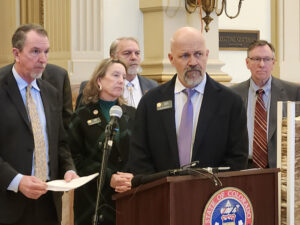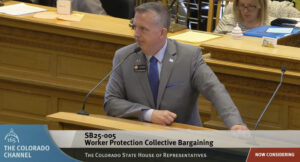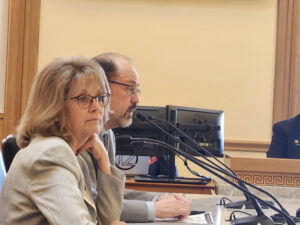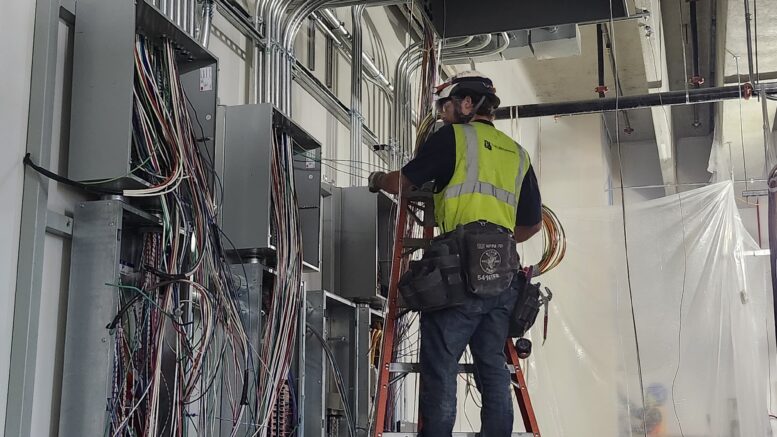A Colorado legislative session that began with Democrats and Republicans feuding over what role regulatory reform should play in reducing the cost of living will end with the two parties coming together to back a regulatory-oversight bill by a vote of 100-0.
Senate Bill 306, which the Senate dispatched to Gov. Jared Polis late Tuesday afternoon after concurring with a small amendment added by the House, doesn’t seek to roll back fees or rules, nor does it seek to take a DOGE-style hatchet to any state agencies. Instead, it asks the Office of the State Auditor to investigate whether two divisions that don’t get regular probing — including one charged with overseeing a disproportionate number of new environmental rules — are implementing state laws correctly.
The idea for the bill, from Democratic Senate Majority Leader Robert Rodriguez of Denver and GOP Sen. Barbara Kirkmeyer of Brighton, came from years of Colorado Chamber of Commerce research that revealed the magnitude of regulatory strain on state businesses. A study commissioned by the group in December revealed that Colorado is the sixth-most-regulated state in the country, and a survey done the same month found that overregulation was far and away the largest issue facing Colorado businesses.
Specifically, SB 306 prescribes four audits — financial inspections of the Air Pollution Control Division in the Colorado Department of Public Health and Environment in 2026 and 2031 and of the Division of Unemployment Insurance in the Colorado Department of Labor and Employment in 2027 and 2032.
Why the two agencies are targeted for regulatory reform
APCD is charged with implementing and enforcing most of the air-quality rules the state has implemented since 2021, and its average time for approving permits has risen from 165 days in 2019 to 459 days last year – despite adding more than 100 employees in that time. The unemployment-insurance division taxes employers and dispenses unemployment payments to workers who lose their jobs through no faults of their own, and efficiency in operations is necessary to keep down the fees on companies that are needed to fund it.

Colorado Chamber of Commerce President/CEO Loren Furman testifies for Senate Bill 306 on April 24 alongside former chamber regulatory affairs advisor Christy Woodward.
Colorado Chamber President/CEO Loren Furman said that SB 306 is meant to examine two divisions that hold significant regulatory power over state businesses and determine if improvements can be made. Rep. William Lindstedt, the Broomfield Democrat who is cosponsoring the bill in his chamber, said it seeks to answer a basic but needed question — whether state agencies are following laws as written or are impeding business in how they choose to implement them.
“This Legislature and past legislatures in the past four or five years have bestowed a lot of authority and power on that division at CDPHE,” said Phil Hayes, a lobbyist for the United Association of Plumbers and Pipefitters who supports the bill. “And we want to make sure that those things are being handled correctly, that people are being treated fairly and that we are encouraging building new things so our members can go to work while also protecting the environment.”
How the regulatory reform conversation evolved
Regulatory reform has been on the minds of elected officials since the beginning of the session, when both Polis and Republican legislative leaders mentioned the need for it in their opening-week speeches. The exact form that it would take went through a host of machinations, however, over the course of the 120-day session that must end no later than midnight Wednesday.
Just six days into the session, Senate Republicans announced a package of regulatory rollbacks and fee repeals that Minority Leader Paul Lundeen estimated could save the average Colorado family $4,500 per year. But Democrats shot down each of those bills and some mirror-image proposals in the House one by one over the next two months, saying that they would strip Colorado of revenue it needs to perform vital services.
A House committee rejected a bill to repeal the 27-cent retail delivery fee charged on companies from Amazon to mobile plumbers after Colorado Energy Office Executive Director Will Toor said it would take too much funding from transportation electrification. A Senate committee killed a bill to end passenger-ride fees and fuel fees when the Colorado Department of Transportation warned it would lose $136.7 million. That same Senate committee later nixed two bills to end a host of fees on products from nicotine to paper bags that fund programs ranging from recycling services to energy assistance.
“This isn’t fiscal responsibility. This is fiscal cruelty dressed up as cost savings,” said Rachel Lehman, lobbyist for the Black and Brown Parents United Foundation.
Another plan emerges

Colorado state Sens. Scott Bright (at podium) and Paul Lundeen (left), along with other members of the Senate Republican caucus field questions at a news conference in January about their package of bills to reduce fees and regulations.
Republicans complained that Democrats were not listening to voters who said they needed relief from rising costs that were driven in part by state rules. “I only wish my Democratic colleagues cared as much about Coloradans’ financial well-being as they do about filling the coffers of state government,” Sen. Scott Bright, R-Platteville, complained after his bill to cut transportation fees died.
While that was going on, though, the Colorado Chamber was working with bipartisan leaders to approach regulatory reform from a different angle.
Furman had two bills that she hoped to introduce. The second one would have required the auditor’s office to review regulations passed over the last decade to see if they are meeting their goals without unduly burdening job creation, much like legislators reviewed the efficacy of every tax break in recent years. But after Elon Musk’s Department of Government Efficiency began slashing whole departments of the federal government, unions and environmental groups equated that proposal with the unrelated federal cuts and stood in its way.
The same groups initially resisted SB 306 as well, calling it unfair to question the work of state employees and saying it attacked divisions most responsible for protecting private-sector workers and the environment. After sponsors made two changes — defining what the audits would investigate and switching one of the target agencies from the Division of Labor Standards and Statistics, which oversees wage-theft and sick-leave claims, to the unemployment-insurance division — opponents stood down.
Job losses speak to need for regulatory reform
When SB 306 got to the House Finance Committee, Rep. Max Brooks, R-Castle Rock, bluntly asked sponsors if they believed it was still going to be able to do enough or if they should just scrap it and seek an audit through the Legislative Audit Committee. Lindstedt replied that he believes it both will keep regulatory state agencies in line and address business concerns, and Furman said she thinks the extra definition in it will streamline the audits and make them more effective.

Colorado state Rep. Max Brooks speaks Monday in the House against the proposal overhaul of the Labor Peace Act.
“I would argue that it improved the bill even more from the introduced bill, which is why we are still supportive of it,” she told the committee. “We think this is a very straight-forward, common-sense bill.”
This increased focus on regulation comes as the Denver Business Journal reports that prominent businesses are choosing to pare down or shut down operations in Colorado. Call-center operator TTEC Holdings announced in March that it’s moved its headquarters from Greenwood Village to Austin, Texas, and financial powerhouse TIAA last week said it is cutting jobs as it shutters its downtown Denver office and relocates workers to Texas.
Sharon Martin, CFO for Rocky Mountain Natural Meats, said it’s not one regulation the state has implemented so much as the constant addition of rules over the past six years that is weighing on companies like hers. The voter-approved paid-family-leave law that went into effect in 2024 means officials are constantly looking to fill jobs temporarily, and workers take undue advantage of recent paid-sick-leave allowances, coming down with Covid-19 repeatedly, she said.
Businesses now looking to expand elsewhere
“People get frustrated, and owners get frustrated,” she said, noting that hers and other companies have cut back on some benefit offerings in order to conform to all the state requirements coming their way. “We still try to treat our employees well. But the more you push regulations on us, the more it’s going to cause us to push back to do the bare minimum needed to comply.”
Another finding of the late 2024 Chamber business survey was the growing number of companies with multistate operations said they will look to states other than Colorado to make investments in future years, in large part because of the regulatory burdens here. That was particularly true among companies with 250 or more employees — those that typically have the resources to add the most jobs — as 48% said they do not plan to grow again in Colorado.
“We are grateful to be in a position where we have operations in other states, and we have sophisticated support teams who can manage the human-resource implications, the tax implications and the additional legal requirements of new laws and regulations,” said Willis Weidel, CEO of Encore Electric. “However, I am concerned that the growing legislative and regulatory burden in Colorado will place an undue hardship on our trade partners and subcontractors, many of whom are small and family-owned businesses.”
As a counterweight to the Senate Republican proposals, legislative Democrats pushed several cost-of-living measures that sought to limit what certain businesses could charge — efforts that those businesses argued would bring even greater regulatory burden. But those bills ran into roadblocks, with legislators putting significant guardrails on a proposal to broaden prosecution of price-gouging, killing one bill to limit childcare fees and paring back another bill that sought to add regulations to that already shrinking industry.
What will be the consequences of this regulatory reform?

Colorado state Sens. Barbara Kirkmeyer and Robert Rodriguez explain Senate Bill 306 to a committee on April 24.
But if business leaders had success in limiting the regulations added onto numerous sectors this year, will SB 306 really do anything to help role them back, as so many employers need?
Backers say that ensuring state agencies are not exceeding regulatory limits is at least a good start.
And audits that keep the regulators in check — and could help to cut permitting times to less than a year-and-a-half — could in turn impact the way that legislators consider adding or cutting regulations in the future, they added.
“I think it’s really important that our agencies follow the statutes we pass. This is a simple ask,” Lindstedt said. “I think that this is a very important bill so that we all can verify that the statutes we pass are being implemented properly.”
